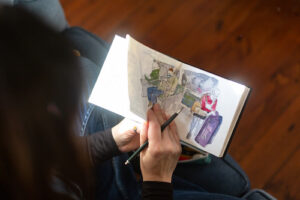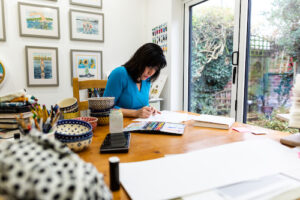Can everyone really draw? Up until recently I wasn’t at all convinced.
That is until I started to teach how to do it. Drawing after all is, on its simplest level, setting marks down on a page based on what we see in front of us. What about this fact is complicated? (More on this in a bit.)
There are so many factors bound up within our cultural (it seems) belief system that some are born more creatively talented than others. Admit it. How many of us have heard “I can’t draw a stick man” or “I was better at sciences at school!” We hear the same creative expletives doing ourselves down generation after generation when it comes to being creative, almost as if we have been divinely chosen to either create or not!
So many people that stumble across Emily’s Notebook are enlivened by my message that “everyone CAN draw and create.” And within a few months of engaging on any level with this community, people, do, indeed, realise that they are happily filling sketchbooks with drawings. Enlightened and often incredulous that they are doing so.
I too, have found myself incredulous that this is the case.
Not because I believe people cannot do so, but more because I am struck that there is a deeper mindset challenge at play that has prevented people picking up that pencil for their entire lifetimes. Can everyone really draw then? If they really want to. Yes!
As you read through my thoughts on the subject I want you to take a passion for wanting to draw, your awareness of the standard at which you are at now, and combine them with some of the practical approaches I put forward below.
If you gave yourself permission to believe you can draw and create would that make a difference?
At the foot of every section I have posed a series of questions for you to think through.
Table of Contents
How Do You Know What You Don’t Know?
We are quick to jump to the conclusion that everyone can’t just draw! Let me ask you this? Have you ever been shown any methodology when it comes to learning to draw? Where and how did you learn it? If you never have how can you assert that you know you won’t be good at it?
What if with a few basic principles you are able to start a drawing skill?
I hadn’t. I wasn’t classically trained. I have learnt everything from a driving passion and genuine interest. I have experimented and failed time and time again. I have crumpled up pages of perspective drawings gone wrong, battling with understanding, working out how things fit in opposition to how my brain thinks. I have gone away and looked up the classic approaches to teaching these things and achieved my eureka moments, the “A-HA” understanding of a method that suits my style.
There is still SO much I do not know about drawing, it does not mean I can’t do it.
What drives our desire to find out what we can about a particular subject? Its not just about being interested. It has to go deeper and further than this. Curiosity.
How curious are you about what you can potentially achieve on a piece of paper with a pencil?
Curiosity spurs us on to uncover what we need to know.
But what if you have been shown the methodology and still believe you can’t draw? At this stage I’d advocate taking a view on the mindset with which you’ve approached this? You still may need to get more curious about why you’re struggling? Is something else at work with your aptitude? Do you have a limiting self belief at play, are you perhaps not as disciplined or rigorous when it comes to assessing where you are at? The same curiosity principle comes into play for you as it would for the beginner.
Question: Are you curious about your potential to draw? What could be your first steps to making it happen? Are you equally curious about why you struggle even though you have an innate desire to succeed?
As you think through this question are there any mindset gremlins that spring into your mind that may start with …..”I can’t possibly do this because…” One of the initial first questions that can spring from this question is where to start. Check out my initial starter materials guide here.
Try and list 5 steps you can take when thinking through pursuing your curiosity or interest in learning to draw. What can support you get out of the starting blocks and putting pencil to paper?
Discipline
Can everyone really draw without applying an element of discipline?
Debatable and I believe not possible. Even accomplished artists had to start somewhere. Van Gogh practiced tirelessly for over 24 months before he was able to accomplish drawings he was comfortable with in his sketchbooks. Alongside curiosity must come a type of rigour or an element of practice.
Discipline is such a strong word and one that does not marry well with our understanding of creativity. Drawing for so many after all is considered a hobby or something we do in our down time, NOT something we should be applying the rigour of discipline to. We spend every waking minute of our lives being disciplined.
Our cultural definition of creativity is somewhat to blame for this I feel. It’s not just about being “inspired” or unpredictable and able to take to a canvas or sketchbook whenever the whim may take us. Picking up the pencil to keep learning whatever you may be feeling feeds into our understanding of how to approach the art of drawing. Discipline develops stamina and resolve, understanding and your artist’s character, within and without.
Drawing is a skill. Skills are learnt. You have to establish an approach to learning how to develop your drawing practice. I keep a daily sketchbook and aim for this process to be as fun as possible. With anything, creating a routine approach to how you build your expertise is important.
It’s important to remain realistic to your routine, your daily habit, the time you have available – all of those things are a critical factor in enabling you to succeed with your new found curiosity of learning to draw. You just have to be diligent enough to be aware of them and realistic as to what you would like to achieve.
Once the discipline is established the consistency will follow. Enjoying what you do will also make this easier! Try not to get too hung up on the word discipline. Your consistent approach will eventually phase away a phrase we have come to associate with something we don’t necessarily want to do!
I believe that we must redefine how we have traditionally perceived discipline in our lives especially in relation to being creative. Discipline in light of something you like and enjoy is perhaps easier to achieve!
Question. Can you apply some discipline to your day to include committing to learning to build a skill of drawing? What would this look like for you?
To help you with the thinking linked to creating a healthy and achievable drawing habit in the pages of a sketchbook, read some of my top tips on the subject and use them to craft your own approach.
Mindset
Where does the belief that you can’t draw (having never been shown how to) come from?
Mindset is often a product of the environment we have been influenced by. Parents, culture, even friendships contribute to the definition we have of ourselves. You may feel you don’t have the “time” available to be creative or fit a drawing pastime into your busy day. You may have impossibly high standards of yourself and simply expect to be able to draw perfectly straight away. You may have been told by a person of influence such as a teacher that you were never any good at this and should stick to something else. And so the list goes on. The layers of negative beliefs building and hardening around you as the years have gone by into false truths.
Likewise, the other mindset challenge we set ourselves is impossibly high standards. In an age of the influencer culture, it is hard not to be impressed and intimidated by perfectly executed artwork and drawing. Yes…the art world has its own equivalent of the perfectly coiffed selfie!
The danger is that the thing we are passionate about trying out for ourselves becomes the thing that we feel crippled by trying. We become vicarious fence sitters – watching reels, instagram posts and demos, you tube videos and so forth without having a go ourselves. We compare ourselves ALL THE TIME. A fine balance needs striking between satisfying our curiosity (or the “how” to do something question) vs feeling overwhelmed by the volume of talented people we can learn from but equally feel intimidated by.
Working through the Artist’s Way by Julia Cameron I was particularly struck by one of the exercises she advocates one works through called the monster hall of fame. The task is to list three old enemies of your creative self worth.
Question; Who are the monsters that have injured your creativity over time? What situations, words, or comments spring to your mind when it comes to being creative?
Identifying the monster hall of fame is the first step in addressing your mindset challenges.
The second part to this section is how to adopt a positive mindset moving forward. The starting point is to negate the monsters you have identified earlier in this section.
Motivation!
Everyone I know that has a successful drawing habit is HIGHLY motivated to do so. I draw every day even if its for 5 minutes at a time. (Check out my thoughts on it here!)
Staying motivated is a foundational principle to learning to draw. Your curiosity is the first trigger to your motivation. Your mindset is the second. When your mindset wanes or discouragement sets in, this is the time to bring forth some ideas to keep you motivated. My passion wasn’t always my daily habit. I had to work to put it there. I had to find ways to stay motivated.
Drawing with others regularly is one such way to do so. You might want to try my weekly free live sketch sessions for example. Setting a regular activity by which you can commit an hour to your creative exploration is a great way to start to build a habit. There are countless ideas to keep you moving forward and motivated. 30 day challenges are one. Specific subject or genres to focus on are another. Daily journalling might accompany written thoughts. And so on.
Staying inspired as a sketchbook is a big deal in my book. I write extensively on the subject as well as focus on this a core element to my teaching programmes, ensuring I focus on keeping students motivated to want to keep drawing.
Motivation is also closely linked to accomplishing a goal and within a creative context aiming for an outcome can be a great motivator.
Question. What motivates you? What do you love and enjoy? What goal would you like to achieve when it comes to drawing? (To fill a sketchbook? Focus on a theme? Draw a human being?) Have a think about your motivators!
Keep It Simple!
Can everyone really draw if we kept it simple? A big yes from me.
We do love to overcomplicate things don’t we? At the start of this article I talked about how drawing is simply putting marks on paper. So many of us immediately use the excuse that something is too complex or difficult to draw.
Do you realise that before you even start to draw an object you have invested and loaded your drawing with interpretation already?
When we perceive what we are drawing we do not see it as lines or markings to get down on paper. We see it as a functional object that seems complex because of the understanding we have of that object, the physical definition we have placed on that object. A kettle boils water for a cup of tea. A kettle is also simply based on 3 lines.
When I teach you to draw I support you “forget” what the object is in front of you. We need to de-mystify and un-complicate the image we are transcribing onto the page, thereby building our drawing confidence. You are in charge of what you draw. This is what can challenge the ease with which you draw. You are only allowed to see it in terms of lines and shapes. It must be undefined and simplified on the page in front of you.
We have to constantly seek ways in which to simplify what we choose to draw. How do you look at something and make it as easy as possible to draw?
Unfortunately we always rush to find a formula or solution (the rules of geometry or perspective, for example,) to help us. How many of us have invariably become more confused and disheartened as a result?
Question: The next time you pick up a pencil to draw, which part of the process feels difficult? Can you define why?
In conclusion.
Can everyone really learn to draw?
The question almost sounds like a science experiment to me. There are a variety of components that need to come together in order to enable anyone to pick up a pencil and draw. The first, do you want to learn? Are you prepared to practice? Are you willing to get curious and go research what you don’t know? Can you make a commitment and stay consistent? Can you take control of your mindset and challenge yourself to get confident by keeping things as simple as possible? Will alone is not enough.
The catalyst, however, that answers the question “can everyone really learn to draw” is the joy that drawing brings.
If you’ve enjoyed reading this article why not check out Emily’s Notebook and join the community for more information on resources as well as free live sketching events.











